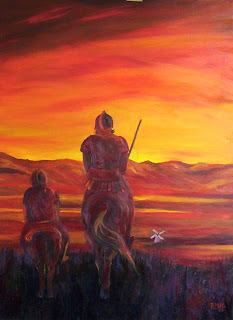
I have now reached page 576. I'd like to start off with Chapter XI and Don Quixote's odd encounter with the wagon of traveling actors. I felt this encounter was very much unlike all of D.Q.'s previous ones because he believed the actors to be actors instead of the ghastly and mythical creators and beings they appeared to be.
"By my faith as a knight errant, " responded Don Quixote, "as soon as I saw this wagon I imagined that a great adventure was awaiting be, and now I say that it is necessary to touch appearances with one's hand to avoid being deceived."
-pg 523-524
The key word here is imagined. Don Quixote openly admits he had imagined that a wagon full of demons and sorcerers, just as he had imagined a giant instead of a windmill, a group of thugs kidnapping a woman instead of a collection of holly men carrying the Virgin Marry. I was greatly troubled when I first read this because it was so outside and foreign to the Don Quixote we have all grown to love and cherish...well at least I do. And then the actors attacked Sancho's donkey, Sancho, and Don Quixote in such a nonsensical and unprovoked manner it seemed as if they were the ones plagued with the madness of chivalry and knights errant, and thought Sancho's donkey to be a giant Minator ready to eat them all alive.
But then, oh, but then a thought stuck me. Actors, like Don Quixote live physically in the low mimetic world of realism but belong spiritually and mentally to the world of Romance. Both
actors and our beloved knight prefer a world of romantic adventures, evil enchanters, courageous knights, and Devils driving wagons over steady paying jobs, madness, crazy old men, and rushed, costumed actors. So Don Quixote was able to accept their ghastly appearances because they were just like his suit of armor; a tool in which to transport them into the Romantic world. Like him, actors are on a quest to better the world; calm mobs, aid widows, and save poor, sad children. But instead of a lance and a squire, the actors are armed with entertainment in their imitations of life, death, and of the beyond.

This next part isn't deeply profound or anything, but I just loved the subtlety in Chapter XIV in the changing of the name of The Knight of the Wood to The Knight of the Mirrors. It happens seamlessly, so much so I had to read read it to make sure I got his name right in the first place. The subtle change of the name unconsciously prepares the reader for the character change. And more importantly, the name builds to the climax of the revealing of Senor Sanson Carrasco. His unveiling answers the mysterious question as to why Senor Sanson was encouraging Don Quixote and Sancho to go back out on their adventuring in the first place, at the beginning or part 2. It was all smoke and mirrors, to employ a favorite cliche. The Knight of the Mirrors was just that, he looked like a knight, lamented and was in love like a knight. He was so convincing that Don Quixote knew he was a knight just by listening to his poem. The Knight of Mirrors was so exquisitely imitative that he was a mirror held up to Don Quixote. Quite letterly since Sanson was using all he knew about Don Quixote's adventures and personal traits as a knight to form his imitation in an attempt to convince Don Quixote to return and stay at home.
This brings me to my last major light bulb moment in my reading Don Quixote.

" A poet is born; that is to say, the natural poet is a poet when he comes from his mother's womb...The natural poet who makes use of art will be a much better and more accomplished poet than the one who knows only the art and wishes to be a poet; the reason is that art does not surpass nature but perfects it; therefore; when nature is mixed with art, and art with nature, the result is a perfect poet. "
And because it's beautiful: "The pen is the tongue of the soul."
pg 557
Ding Ding Ding! Light Bulb! If you've ever tried to write a poem you'd understand my enthusiasm. You aren't a poet by choice. You can write poetry all you want but it doesn't make you a poet. When you read a poem by some one who wasn't born a poet, you can tell that it's a poem about nature instead of a natural poem embodying and beautifying the truth that is nature. A natural poet will embody the beauty and fury of the sea and the intrinsic frailty of a flower with their mere employment of letters. They don't try to make nature something it's not, they just take all the beauty of it and stick it under a magnifying glass. Together, a poem should be nature and art; a unified wording of nature's potential and existing beauty.
A unnatural poet; a poet not born but self created, will try and take nature and only write of the art of it. Instead of a colorful Impressionist painting we get a black and white Polaroid.
No comments:
Post a Comment